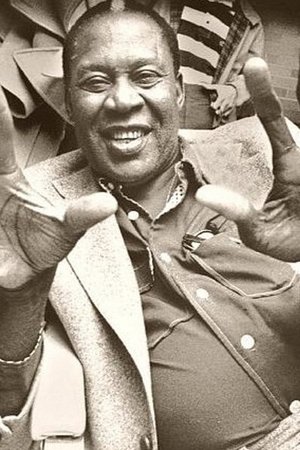Memphis Slim (1915-1988)
Alias:
John Len Chatman
Peter Chatman
Birthplace:
Memphis, Tennessee, USA
Born:
September 3, 1915
Died:
February 24, 1988
John Len Chatman (September 3, 1915 – February 24, 1988), known professionally as Memphis Slim, was an American blues pianist, singer, and composer. He led a series of bands that, reflecting the popular appeal of jump blues, included saxophones, bass, drums, and piano. A song he first cut in 1947, "Every Day I Have the Blues", has become a blues standard, recorded by many other artists. He made over 500 recordings. He was posthumously inducted into the Blues Hall of Fame in 1989. Memphis Slim was born John Len Chatman, in Memphis, Tennessee. For his first recordings, for Okeh Records in 1940, he used the name of his father, Peter Chatman (who sang, played piano and guitar, and operated juke joints); it is commonly believed that he did so to honor his father. He started performing under the name "Memphis Slim" later that year but continued to publish songs under the name Peter Chatman. He spent most of the 1930s performing in honky-tonks, dance halls, and gambling joints in West Memphis, Arkansas, and southeast Missouri. He settled in Chicago in 1939 and began teaming with the guitarist and singer Big Bill Broonzy in clubs soon afterwards. In 1940 and 1941, he recorded two songs for Bluebird Records that became part of his repertoire for decades, "Beer Drinking Woman" and "Grinder Man Blues". These were released under the name "Memphis Slim," given to him by Bluebird's producer, Lester Melrose. Slim became a regular session musician for Bluebird, and his piano talents supported established stars such as John Lee "Sonny Boy" Williamson, Washboard Sam, and Jazz Gillum. Many of Slim's recordings and performances until the mid-1940s were with Broonzy, who had recruited Slim to be his piano player after the death of his accompanist Joshua Altheimer in 1940. After World War II, Slim began leading bands that generally included saxophones, bass, drums, and piano, reflecting the popular appeal of jump blues. With the decline of blues recording by the major labels, Slim worked with emerging independent labels. Starting in late 1945, he recorded with trios for the small Chicago-based Hy-Tone Records.[8] With a lineup of alto saxophone, tenor sax, piano, and string bass (Willie Dixon played the instrument on the first session), he signed with the Miracle label in the fall of 1946. One of the songs recorded at the first session was the ebullient boogie "Rockin' the House," from which his band would take its name. Slim and the House Rockers recorded mainly for Miracle through 1949, with some commercial success.[1] Among the songs they recorded were "Messin' Around" (which reached number one on the R&B charts in 1948) and "Harlem Bound".[9] In 1947, the day after producing a concert by Slim, Broonzy, and Williamson at New York City's Town Hall, the folklorist Alan Lomax brought the three musicians to the Decca Records studios and recorded with Slim on vocal and piano. Lomax presented sections of this recording on BBC Radio in the early 1950s as a documentary, The Art of the Negro, and later released an expanded version as the LP Blues in the Mississippi Night. ... Source: Article "Memphis Slim" from Wikipedia in English, licensed under CC-BY-SA 3.0.






